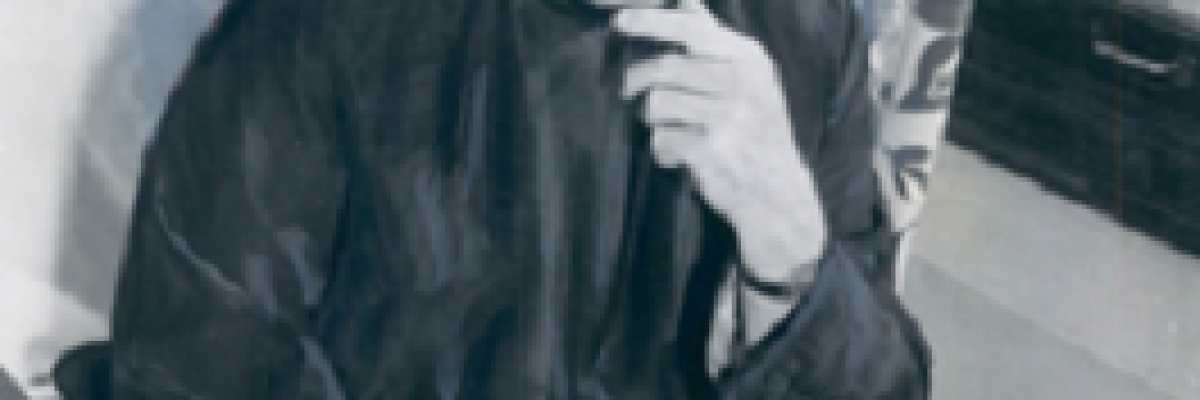
A friend, a late vocation, left town for a distant seminary. Wanting to travel light, he donated a box of old books to the Catholic Answers library. Among them were six volumes comprising The Book of Catholic Authors. The first bears a copyright date of 1942; the sixth, undated, seems to have been published around 1961. The editor of the series was Walter Romig, who produced a book I have in my home library, The Catholic Bookman.
Of the sixty or so writers profiled in the first volume, I recognize only five: David Goldstein, a Catholic apologist who converted from Judaism; Winfrid Herbst, S.D.S., author of books on spirituality; Daniel Lord, S.J. (pictured), known for his novels and dramas; Msgr. John A. Ryan, whose topic was social ethics; and Daniel Sargent, poet and biographer.
The other names are strange to me: Mabel Adelaide Farnum, historical novelist; Thomas A. Lahey, C.S.C., author of children’s books; Sr. Mary Madeleva, poet; Fr. Will W. Whalen, playwright. And so with all the rest.
The six volumes are subtitled Informal Self-Portraits of Famous Modern Catholic Writers, and a promotional line notes that the books are “fully illustrated by [photographic] portraits.” The photographs are what first caught my attention. All of them are black-and-white, and the older ones have that ethereal quality that makes the eyes seem especially piercing, the skin almost translucent.
About half the profiles, and so half the photographs, are of women. There’s Covelle Newcomb, a writer of children’s books; with bangs pasted against her forehead and a lost look on her face, she reminds me of Flannery O’Connor. Mary Perkins, author of At Your Ease in the Catholic Church, looks like a young Katharine Hepburn, only less angular and more attractive. Eva J. Ross, a sociologist, faces away from the lens and reminds me of another Eva, General Peron’s wife.
Most of the writers composed their own sketches, but the one on the then-deceased Margaret Yeo, a writer of historical novels and a convert from high-societyism (she wears pendant earrings and her neck is framed in fur) is by Msgr. Ronald A. Knox. He notes that “her husband, who remained a delightful pagan, was a chronic invalid and no breadwinner,” while Mrs. Yeo “was a loyal and active Catholic, without a trace of the fussiness and stuffiness which sometimes dim the lustre of good example.” (That last line echoes the style of Samuel Johnson.)
In six volumes are profiled at least three hundred Catholic writers I’ve never heard of. I don’t think of myself as ill-educated, and I’m familiar with many more writers than I’ve read, but still . . . What happened to them? They disappeared down the memory hole.
Some may say that they deservedly disappeared, that their writings weren’t worth preserving. Maybe so, in some cases. But even the names I recognize—good writers all—are known to few Catholics today. Goldstein? Herbst? Lord? Ryan? Sargent? Few literate Catholics under sixty have heard of any of them. We have lost our literary consciousness, and we won’t be able to hope for a Catholic society until we get it back.
“Whoa!” you may say. “Just look at what happened in recent elections. The bad guys won and the good propositions were defeated. If we’re to clean up our society, we need to attend to the next election, starting right now. Let’s not waste time talking about forgotten Catholic writers.”
I see the point, but I disagree. I don’t want to discount the importance of politics, but we need to recognize that salvation doesn’t come out of a ballot box—not even cultural salvation. If our society is to be turned around, it has to be turned around on a lot of fronts, including the literary.
Something we should be seeing by now, having hit our collective heads against the political walls for decades, is that there is no prospect that new faces will make much difference unless they are backed by brains filled with the right ideas. You can’t just vote a Christian culture into being. It has to be lived into being, and it has to be lived on all fronts, including the literary—and the political. If we neglect any front, we lessen the chances of a revival.
If there were no Catholic writing, there could be no truly Catholic candidates for political office—at best they would be Catholic in name only, entertaining no Catholic thoughts. If they have no Catholic thoughts, they can engage in no Catholic form of politics. At that point I, for one, would lose interest.
Yes, I look forward to the next election. I relish the prospect of political foes biting the dust and (relatively) good guys riding in and taking charge. But white hats won’t be enough. Our society needs good guys (and, yes, gals) with good ideas, and I don’t mean just good political ideas. Political ideas can’t survive without support. They need a cultural matrix, as a plant needs good soil.
I hope the right people run next year, and I hope they spend plenty of time, between now and then, reading good Catholic writing, including the “forgotten” stuff. If they don’t, they likely will wither in office.



